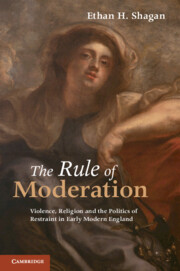4 - Puritan moderation
from Part II - Moderate churches
Published online by Cambridge University Press: 05 June 2012
Summary
Puritan self-government
In 1582, a bookbinder named Thomas Gibson painted disquieting graffiti in a church in Bury St Edmonds. Next to the royal arms, which Queen Elizabeth had erected in every parish church, Gibson wrote God's condemnation of the Laodiceans from Revelation 3:15–16: ‘I know thy works, that thou are neither hot nor cold. I would thou were cold or hot. Therefore because thou art lukewarm, and neither cold nor hot, it will come to pass, I will spew thee out of my mouth.’ These dangerous sentiments remained for ‘a quarter of a year, in a most public place, without concealment’ until Richard Bancroft, who was passing through the puritan stronghold of Bury to preach against the ‘pretended Reformation there’, notified local officials. According to the later reminiscence of Archbishop Whitgift, Bancroft was ‘greatly maligned, by no mean persons, for doing his duty’. When Church authorities painted over Gibson's quintessentially immoderate text with less provocative verses, he countered by adding Revelation 2:20: ‘Notwithstanding, I have a few things against thee: that thou sufferest the woman Jezebel, which maketh herself a prophetess, to teach and deceive my servants; to make them commit fornication, and to eat meat sacrificed to idols.’ This remarkable incident was remembered the following year by the queen herself, who used it as an opportunity to remind her clergy that the Church of England was a moderate via media between puritans and papists who questioned her authority: ‘I have heard that some of them of late have said that I was of no religion – neither hot nor cold, but such a one as one day would give God the vomit. I pray you, look unto such men…Both of these join together in one opinion against me, for neither of them would have me to be Queen of England.’
This confrontation corresponds to our textbook understanding of puritanism: an almost Manichaean worldview in which the binary opposition of true religion and popery, the godly and the ungodly, left little room for moderation. Puritanism, in this view, was generated by the rejection of compromise – most famously the Elizabethan Settlement of 1559 – and was committed to replacing lukewarm conformity with hot, zealous faith. This propensity for continuous Reformation, interrogating every thought and action for signs of compromise with the world, encouraged puritans to generate increasingly radical factions, until in the 1640s the regulatory apparatus that had restrained their centrifugal energies was removed and puritanism itself flew apart into sectarian chaos.
- Type
- Chapter
- Information
- The Rule of ModerationViolence, Religion and the Politics of Restraint in Early Modern England, pp. 149 - 184Publisher: Cambridge University PressPrint publication year: 2011

